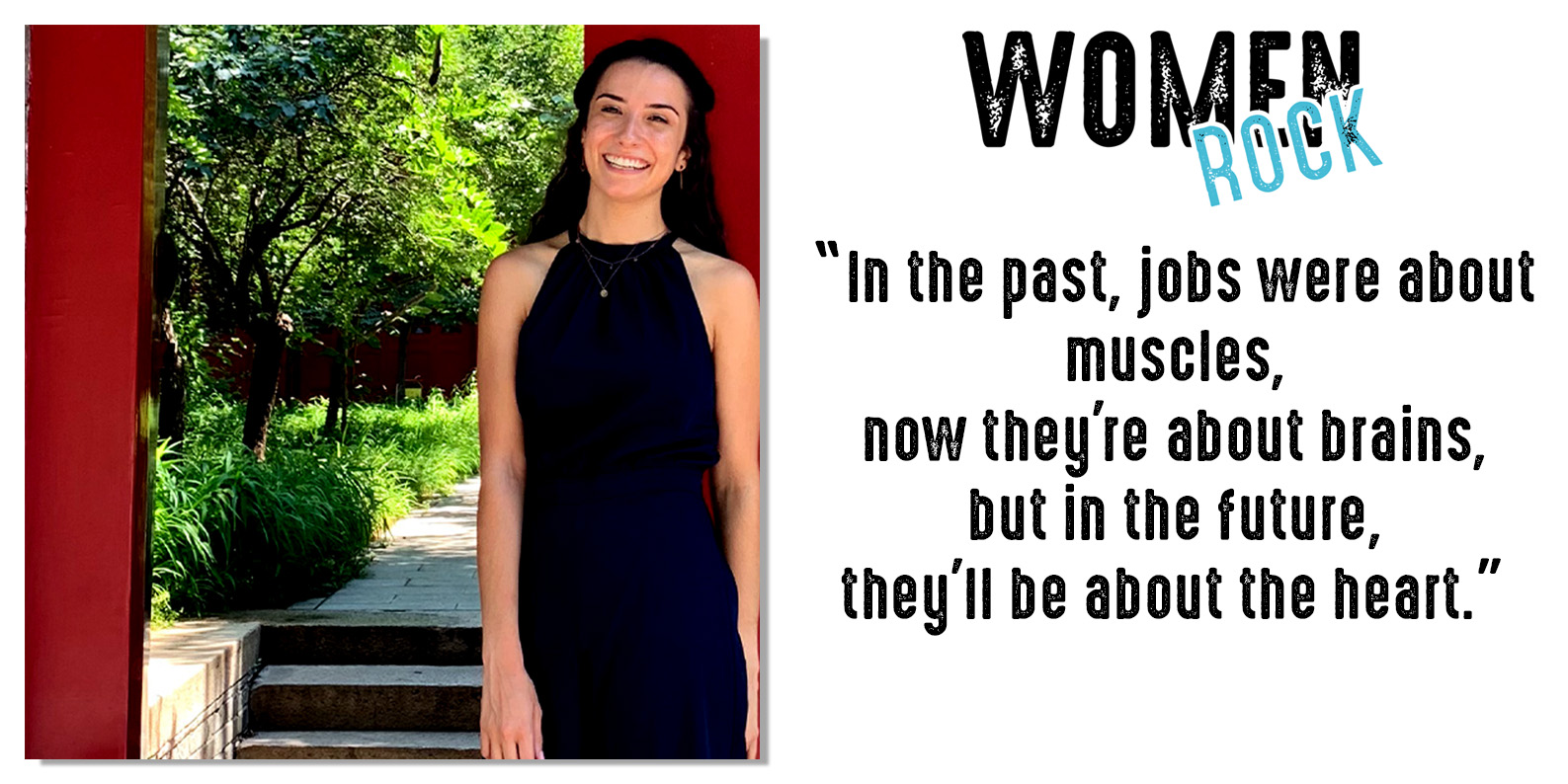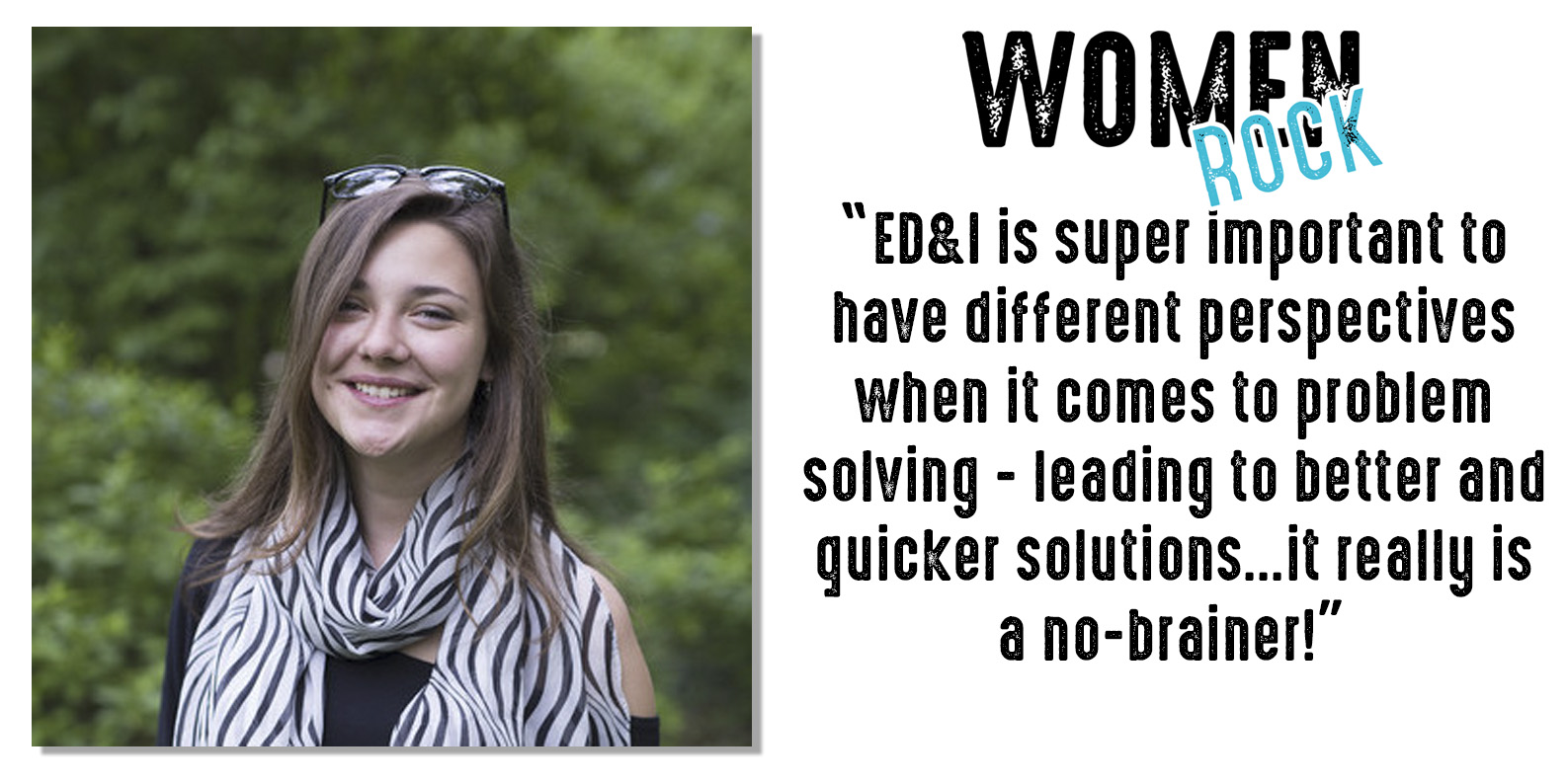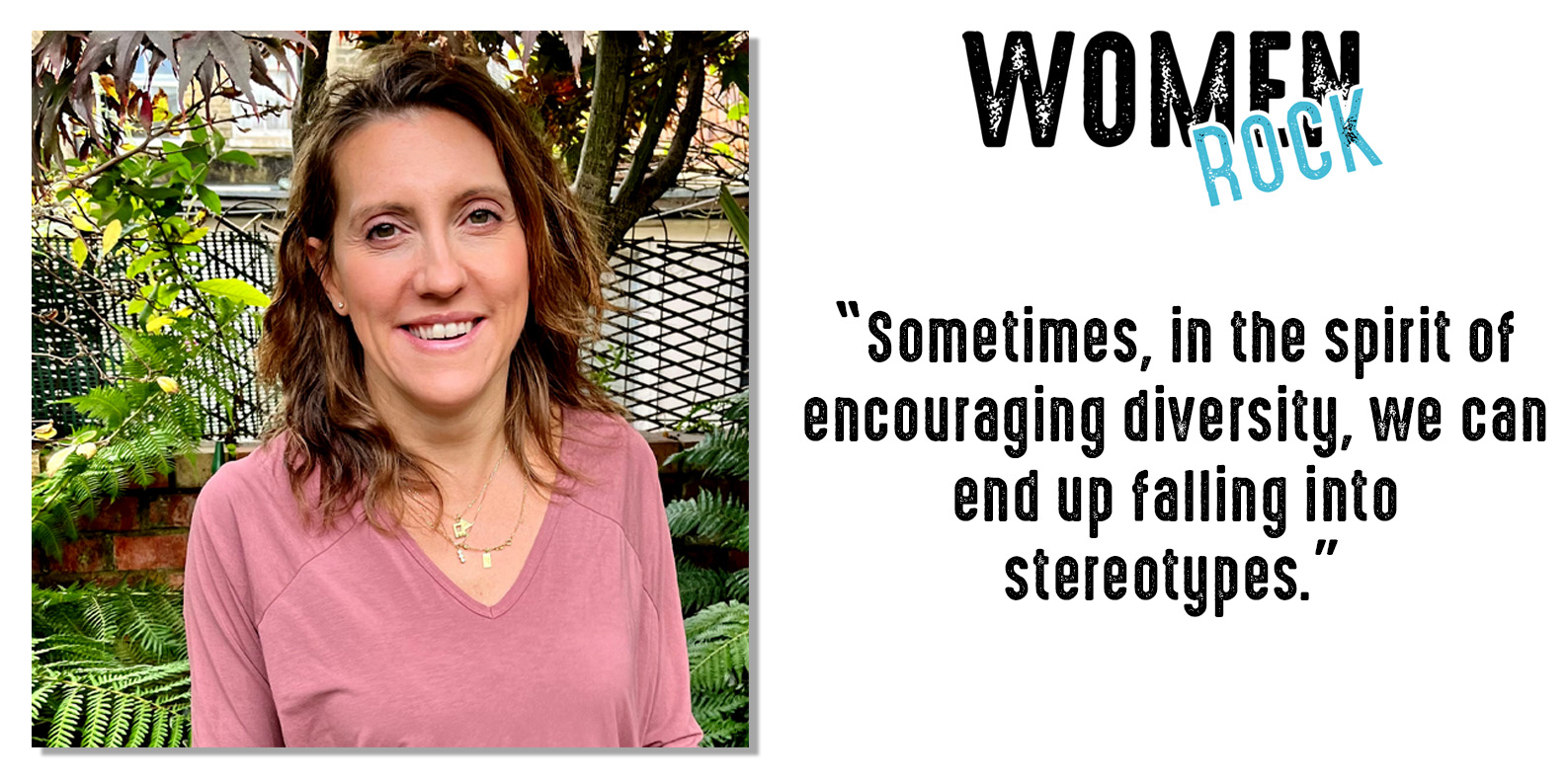This week Maddie Clingan is taking us on a journey into the unknowns of Agile Coaching and we couldn't ask for a better tour guide. Maddie followed her dream of working for a tech start-up after working for one in Beijing while doing her masters. Originally interviewing for a business strategy role, she ended up accepting an Agile Coaching position and, quite frankly: nailing it. As an Agile Coach, she has the opportunity to look at how people work together, and how people collaborate which often gives Maddie permission to talk to people about diversity, and inclusion - another huge passion of hers, a passion that grew as she travelled the world and truly embraced different ways of doing things.So, strap yourself in for a journey that explores the past, present and future of being a woman in tech...CAN YOU TELL US A LITTLE BIT ABOUT WHAT IT IS THAT AN AGILE COACH DOES PLEASE?Yes, absolutely. And I think that sense of being unassured and unfamiliar with this role or the Agile profession is really common. So even for myself about three years ago, I hadn't had any exposure to Agile. I actually said yes to my first Agile Coaching role without fully knowing the extent of what's involved. So it's been a learning process for me as well, and it's really nice to go on that journey alongside teams and companies. So, if I give a little bit of background, Agile is a way of working that has come become quite prolific across lots of different industries. But it started off in tech in 2001 when a group of people got together and wrote the Agile Manifesto. I think one of the really important things to know about Agile is that it was actually the response to a problem that they were experiencing in IT projects. So, namely, they tended to be planned upfront and delivered in quite a sequential way. And by the time they came to market, they weren't actually relevant for business or user needs anymore. So perhaps, as an example, if you think about the pandemic, if you planned something before that, and then delivered it a year later, whilst the pandemic was happening, the industry and the business and users are completely different, and needs and wants have changed. So Agile is a way of working that responds to that by looking at creating small, iterative feedback loops, and ways of working that create those feedback loops, both within teams and product groups with users and stakeholders. Agile Coaches are there as the people who are well versed in that way of working (or eventually become well versed in that!), and they help teams to bring those ways of working to light and continuously improve their process.HOW DID YOU GET INTO THE AGILE SPACE, PARTICULARLY IN TECH AND HOW DID YOU GET INTO THE INDUSTRY AS A WHOLE? Yeah, so my journey was slightly unintentional and also almost Agile and iterative. Again, unintentionally! So I originally wanted to seek a role within a startup because I'd worked in a startup in Beijing where I was doing my Master’s, and I really liked that environment as it was fast-paced, and I was given a lot of autonomy and responsibility. And so that was the direction that I started out in when I returned to London. And then in the process of that, I came across a tech startup that specialised in Lean and Agile product delivery. And I interviewed for a business strategy role there, and throughout the interview process, I got to know the interviewers. Around kind of stage three, they told me that their business direction had changed and they weren't looking for someone to go into this role, but they would really like to help me find a position. And I thought they were being very polite at the time, but what ended up happening was that they suggested that I went for an Agile Coaching role at one of their clients. And so I went for that and was successful. After I started the role, they coached me in Agile principles and ways of working, and, eventually, I ended up taking over the responsibility that they had as an external consultancy, but as an internal coach. So it was a real team effort, and I learned a lot along the way. I have a lot of credit to give to the people that helped me, believed in me, and put me forward for these roles.SPEAKING ABOUT THE BROADER TECH SPACE NOW: WE OFTEN GET ASKED HOW YOU GET INTO THIS, SPECIFICALLY - ARE UNIVERSITY DEGREES IMPORTANT? WHAT ARE YOU THOUGHTS? Yeah, so I tend to think about two sets of groups within the world of tech. So you have, at least in my mind, one group of people who have a really strong knowledge base. They might be your kind of Engineers, Developers, Security Specialists, or DevOps people. And for those kinds of roles, given that the contribution that you bring to the team tends to be quite specialist, I would say there's only ever a benefit to starting earlier, but that by no means excludes you if you want to start later. And then you've got another set of roles that are, in my mind, much more skills-based. So, potentially, Agile Coaches, Scrum Masters, Product Owners, or even User Researchers whose contribution is much more are focused on the skills and ways of thinking that they bring to get different contexts. And for those types of roles, I'd say in regards to your university degree or your previous experience, it matters less about the industry and more about the skills, experience, and impact that you'll be able to build up during that time. But I think regardless of whether you're going into either set of roles there, it's never too late to start. There are so many resources out there, so many different journeys and so many ways that you can get self-taught. So I'd say if you have that vision, start early, but never feel that you're excluded from the tech path just because you didn't do a university degree or haven't started yet.D&I is super important to have different perspectives when it comes to problem-solving - leading to better and quicker solutions...it really is a no-brainer! DIVERSITY AND INCLUSION IS SOMETHING THAT YOU'RE QUITE PASSIONATE ABOUT. SO WHAT DO YOU THINK CAN BE DONE TO HELP ATTRACT A MORE SORT OF DIVERSE MIX OF PEOPLE INTO THE TECH SPACE, WHICH CLEARLY IS GOING TO BENEFIT EVERYONE INVOLVED? Yeah, absolutely. So I think there's this stereotype of the character who works in tech. So that might be the kind of lone wolf male who sits in a dark room typing away at his keyboard, and I think if you have that image of tech, then that might not feel like a welcoming environment for someone who is not of that demographic. But I think actually, that's a very inaccurate representation of what working in tech looks like. Tech is one of the spaces that are trying to be really intentional about ways of working. Hence you have people involved, like Agile Coaches, whose whole job description is to look at how people work together, and how people collaborate. And so some of the values, specifically the Scrum values, such as openness, respect, and courage, really facilitate spaces where diverse voices are welcome and where people of different viewpoints can come together to try and find a consensus that satisfies lots of different requirements. I think those are the spaces that really benefit, as you said, from diverse viewpoints. So if we can change the image of tech to one that's a lot more vibrant, a lot more open, and a lot more intentional about these things, I think maybe more people would consider coming into the space. I know like me, myself, had I known that five years ago, I probably would have been much more open to coming into the industry. AS A WOMAN IN TECHNOLOGY, WHAT SORT OF CHALLENGES HAVE YOU FACED?I'd say one of the unique things about being a woman in tech is that it's very normal to be the only woman in the room. And I think that's not a problem in isolation, but it becomes a problem when that's the only professional environment that you ever experience.I, myself, tried to be quite intentional about getting female coaches, and female mentors, to have more perspectives, opinions, and professional experiences that I can draw on. And that's been really helpful for me to see those role models and understand how other people navigate these spaces. And then I think, at least in my case, being an Agile Coach puts me in quite a unique position where I'm given permission to look at ways of working and how companies set themselves up from an organisational perspective, which often gives me permission to talk to people about diversity, inclusion and, in general, be more vocal in that area. So I've had a lot of opportunities to have these conversations with companies and be part of the solution as well. Overall, I've loved the opportunities that I’ve had so far in this space: both in getting the support that I need, but also in trying to be part of the solution to make environments more welcoming for others.IN TERMS OF TECH AND IN YOUR PERSONAL LIFE AS WELL, WHAT ARE YOUR PROUDEST ACHIEVEMENTS SO FAR? I think one of the interesting things is that there's a program that I really want to go on called I Am Remarkable, which helps women speak about their achievements. It feels a little out of character to speak about what I’m proud of, but I will give it my best shot. I think the situations where I feel most proud of myself are the ones where I've taken things from an idea to full implementation, and you see the effects in the real world, impacting people. So I'd say on the tech side of things about a year or two into my first job, I was put on a second project from the get-go. We were able to take that idea and bring it all the way through initial discovery, then create a continuous discovery approach, as well as continuous delivery. We created ways of working where we were consistently delivering value for clients, and for the company more broadly, and I loved being part of that whole process from end to end. I got to work with such a diverse range of people, some of whom work really new to tech, for example, their first job, and some of whom had been there for many, many years. It was such a vibrant and collaborative process. And there was something so tangible (the first iteration of the product) that we were so proud of at the end, just before I left the role. That was a great, great experience. And then on the personal side of things, I had the idea when I was much younger than I am now - it makes me feel old to think about it! - but when I was a teenager, I was really fascinated by international affairs and China, and I had the idea that I really wanted to build up expertise in that area and create a forum for dialogue for young people to discuss what a rising China might mean for certain countries and industries. And so I did various things, such as going to China before my undergrad, learning the language and studying, and then I eventually got a full scholarship for my Master’s. From there, I contributed to a conference that brought people from around the world to Beijing. So, again, going from an idea to then living in Beijing, working in Beijing, and being surrounded by people with a similar kind of aspiration. I was really proud of that as well.IN TERMS OF WHERE WE ARE NOW, WE'RE AT THE START OF 2023 - WHAT DO YOU THINK 2023 HOLDS FOR YOU? AGAIN, INSIDE AND OUTSIDE OF WORK?Yes. So I think from a professional side, this year for me has been focused on looking at what's called flow metrics and probabilistic forecasting, which is a way of working that falls under the Agile umbrella. It really helps teams answer the question: when will it be done? which is notoriously hard in Agile where you're constantly learning as you go. So I had been looking at implementing that in the teams that I'd worked with at my previous company, and now doing a lot of training and knowledge sharing at ControlPlane in regards to this. So that's something that I'm really excited about because I think that it resolves a lot of these age-old tensions between more traditional ways of working and Agile ways of working. I'd like to get a certification in that area towards the end of the year just to formalise my learning there. And then I'd say, outside of work, I am really focused on my own health journey. Around a year and a half ago, I got really sick with a virus that wasn't COVID but left me with really, really, strong post-viral fatigue so I couldn't get out of bed for a long time. It was often a struggle to walk and then I also, somewhat unrelated, had really bad back pain. So it's been a very iterative journey again, to come back to full health but I've done amazing things like hiking across Albania last month, and, alongside that, I’m building up my frequency of going to classes like spin. And for me, that's really exciting as well, because I want to get to a place where I feel really physically strong too.IN YOUR FREE TIME WHAT MAKES YOU HAPPIEST OUTSIDE OF WORK?Related to what I just mentioned, I love travelling, being in new environments, learning about new cultures, and having that experience alongside good friends. I'm going to Amsterdam in a couple of weeks, and I've just been to Albania. I think that those experiences really help to shape me and my ways of thinking, and shake up my relationships too, so I love doing things like that. And yeah, overall I'd say I enjoy investing in relationships and the people around me. I have a lot of international friends from my time in Beijing so there are always good debates happening with us discussing various things that we're thinking about and the various things going on in the world.IN ONE SENTENCE, HOW WOULD YOU SUM UP YOUR CAREER SO FAR?I would say a squiggly career. This is the concept that there aren't necessarily linear ladders that you need to progress up. But you can do lots of different things, experiment, and try lots of different industries to see what you're interested in. For example, my background spans lots of different humanities and China studies, and now I'm in tech. So I see that as squiggly, but something that's really exciting for me as I navigate all of these different areas and find joy in all of them.ARE THERE ANY COMMON THEMES TO ALL OF THEM?Yes, I would say the common theme is that I'm primarily motivated by the environment that I'm in rather than necessarily the context of the work.I think when a lot of people think about their careers, they consider: what industry do I want to go into? And they think less about: what will my life look like in that field. Whereas I'm much more concerned about the atmosphere. This means that I seek out environments that are fast-paced, challenging, and tend to be cutting edge and help you really understand the world. So I would say that's the common theme.It's taken me to all of these different places, and I think will take me to many different places again in the future.WHAT YEAR WOULD YOU LIVE IN - PAST, FUTURE OR PRESENT? PERHAPS, IN A DIFFERENT COUNTRY, AND WHY? This is a hard one. I think I will close off any past options because I think being a woman in the world of work wasn’t great. I say I would love to go into the future and understand what the world of work looks like in 30 years because I'm really hopeful that it will develop and expand to be much more kind of human-centred, much more intentional, much more focused on how we collaborate and work together as people. And, hopefully, that creates great working environments for everyone and also better outcomes for businesses.WHAT IS YOUR FAVOURITE QUOTE?This is a quote that I found in Brené Brown’s Dare to Lead book, and it stuck with me ever since.And it is: “In the past, jobs were about muscles, now they're about brains, but in the future, they'll be about the heart.”And for me, that reminds me of the bigger picture transition that we've gone through in the last couple of hundred years in terms of what the world of work has looked like and also what success and leadership have looked like, throughout the different stages of work. And this, for me, ties into Agile because I think that now we're in a period where the main skill set that one should have is the ability to navigate uncertainty and continuously learn, and leadership in that field looks like creating those environments for teams. That is much more about the heart because, contrary to feeling like you always need to get it right and to have the right knowledge, it's much more about creating an environment so that other people succeed. I think that challenges traditional notions of leadership and success, but if you're able to do that internal work, collaborate with others, and create good working environments, I think the possibilities are endless. So yeah, I'm really hopeful about what's to come. Thanks, Maddie you rock 🤘Interview by Ben Dennison

 US
US DE
DE








